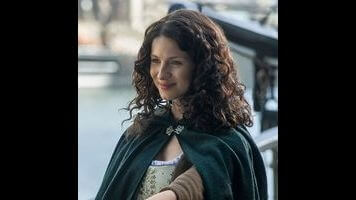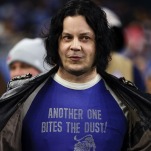Claire feels useless. Her life has become too conventional; she has become too conventional. As a woman in 18th-century France, she doesn’t have access to the spaces where most of the scheming goes down. Jamie gets to manipulate and investigate over chess and trips to the brothel. All she can really do is run the house and hope that one of her many social events eventually provides something useful. Claire simply isn’t built for the socialite life though. She quite literally likes to get her hands dirty. So when an opportunity arises for her to volunteer at a charity hospital in town, she jumps at it. The episode is sharply fixated on Claire’s psyche, and both the writing and Caitriona Balfe’s performance excellently capture the transformation that happens after she starts working at the hospital as well as the inner turmoil Claire feels about keeping the truth about Black Jack from Jamie.
Jamie’s feelings inform the episode, too. When he comes home and finds Claire is out and about treating poor people, he lashes out at her, accuses her of putting the baby at risk and of not being there for him when he needs her. Even though Jamie comes off as a bit of an ass, he still makes some very valid points. He’s out and about trying to stop a rebellion because he has blind faith that his wife from the future is right about it being the right thing to do. Claire’s frustrated, but Jamie is too, and the emotional beats of his arc in the episode are also very well developed and treated with complexity. Jamie isn’t actually mad at Claire; he’s just unfairly taking out his anger on her. Just when they were starting to make some progress in their plans, the prince has to go and ruin everything by revealing the supposed existence of a bunch of English patriots willing to fund the rebellion. It’s a pretty major setback, and Jamie’s disappointment compounds with all the other tangled feelings he has been having in this first stretch of the season. Jamie is still very much so healing—physically and mentally. For both Claire and Jamie, the writers make it clear that their emotions aren’t just stemming from what happens in this episode. Rather, they’re informed by everything that has happened in the series up to this point. Claire all along has been an independent woman who does not confine herself to gender roles or anyone’s expectations. It makes perfect sense that her new life is causing her so much distress and that her work at the hospital makes her feel a little better. The characters might be trying to change history, but the Outlander writers are very committed to personal histories of the characters. They know them inside and out, and that makes for complex and visceral storytelling.
Louise de La Tour continues to be the Regina George of 18th-century France, responding with feigned shock when Mary explains, essentially, that French men like to fuck. I’m hoping Louise becomes a bigger player in the story, because she’s such a fun character. For now, she provides some much needed comedic relief. And Claire actually does learn something useful—and devastating—at one of her tea gatherings with Louise and Mary. It doesn’t really help on the rebellion-prevention front, but Claire makes the connection that Mary is the direct ancestor of Frank. Claire hadn’t really thought of this before, but Frank’s very existence depends on the survival of Black Jack. Now, thinking too hard about time travel tends to make my brain hurt, so I won’t get too far into the logistics of what it would mean for both Claire and Jamie and everyone they encounter in life if Frank is never born, but purely on an emotional level, this revelation is a powerful one. I think the reason Claire hadn’t really thought about what Black Jack’s death might mean for Frank is because of the stakes when it came to Black Jack last season. He was such a horrible monster who had committed such horrible abuse that he needed to die in her mind. Now, with the realization that he’s alive and her accidental proximity to the woman who he’ll continue the Randall line with, it all comes into focus. Black Jack has to live for at least another year in order for Frank to exist. But how many horrors will he be responsible for if he keeps on living? This episode doesn’t quite deal with all of the ramifications of Claire’s realization yet, but she faces quite the moral quandary moving forward.
Even though it’s a richly emotional episode, there are also plenty of exciting adventure elements that keep the story moving forward. Jamie hires a pickpocketer from the brothel to help steal letters addressed to the prince and king, which he and Murtagh then copy and reseal, hoping to find any clues as to who these British benefactors might be—if they even exist. They eventually have to crack a coded letter hidden in music with the help of the Mother Superior who runs the charity hospital, leading to some thrilling 18th-century spy action. Outlander is so many things at once. Like its protagonist, it defies conventions and simple categorizations. This week, the show even taps into its medical drama leanings as Claire accurately diagnoses a case of diabetes—called “sugar sickness” back then—and Bouton the hospital dog proves to be a useful pathologist himself. But above all else, the most important element of Outlander’s storytelling equation is its characters. Their actions matter because of all the well written character development they’re grounded in.
Stray observations
- Mary explains that men don’t do that where she comes from, and Louise replies: “And where is that? The Moon?” Fortunately, it seems Claire intends to have the birds and the bees talk with Mary, which means it will be one that is sex positive and ahead of its time.
- On that note, Claire helps out her lady’s maid Suzette by securing a contraceptive for her.
- Sometimes, Claire’s insanely good memory seems a little too convenient.
- There are some fun history Easter eggs in here, like the fact that Mother Hildegard is friends with Bach.
- Claire is about to tell Jamie the truth about Black Jack, but he’s so busy celebrating the fact that they’ve connected the Duke of Sandringham to the rebellion that she can’t bring herself to do it. “I just love seeing you so happy,” she says. Heartbreaking.








![Rob Reiner's son booked for murder amid homicide investigation [Updated]](https://img.pastemagazine.com/wp-content/avuploads/2025/12/15131025/MixCollage-15-Dec-2025-01-10-PM-9121.jpg)

























![HBO teases new Euphoria, Larry David, and much more in 2026 sizzle reel [Updated]](https://img.pastemagazine.com/wp-content/avuploads/2025/12/12100344/MixCollage-12-Dec-2025-09-56-AM-9137.jpg)






